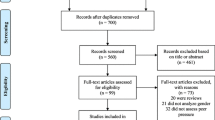Abstract
This research, using the content, validity and clinical scales found in the MMPI-2, investigates the differences in the psychological makeup of male versus female police recruits. The research design involves testing of police recruits on the first day of their academy experience. The literature on the police personality suggest that there exists a stereotype for male officers, a finding replicated in this study. The findings of this research also suggest that female officers do not generally fit the stereotype found in the study of male officers.
Similar content being viewed by others
References
Balch, R. W. (1992). “The Police Personality: Fact or Fiction?”The Journal of Criminal Law, 63:1 106–119).
Carpenter, B. N. & Raza, S. M. (1987). “Personality Characteristics of Police Applicants: Comparisons Across Subgroups and with Other Populations.”Journal of Police Science and Administration, 15 1 (10–17).
Cortina, J., Doherty, M., Schmitt, N., & Smith, R. (1992): The “Big-Five” Personality Factors in the IPID and MMPI: Predictors of Police Performance.Personel Psychology, 45, 119–140.
Gould, Larry A. (1995). “Can an Old Dog be Taught New Tricks: Teaching Cultural Diversity to Police Officers.” Paper presented at the Annual Meeting of the Canadian Sociology and Anthropology Meeting, Montreal, Quebec, Canada. (June)
Evans, B.J., Coman, G.J., & Stanley, R.O. (1992). “The Police Personality: Type A Behavior and Trait Anxiety.”Journal of Criminal Justice, 20:420–441.
Hargrave, G., & Hiatt, H. (1987). “Law Enforcement Selection with the Interview, MMPI, and CPI: A Study of Reliability and Validity.”Journal of Police Science and Administration, 15(2), 110–117.
Hathaway, S. R. & J. C. McKinley (1991).Minnesota Multiphasic Personality Inventory-2: Manual for Administration and Scoring. University of Minnesota Press. Minneapolis: Minn.
Inwald, R. (1988). “Five-year Follow-Up Study of Department Termination as Predicted by 16 Preemployment Psychological Indicators.”Journal of Applied Psychology, 73, 703–710.
Inwald, R., & Shusman, E. (1984). “The IPI and MMPI as Predictors of Academy Performance for Police Recruits.”Journal of Police Science and Administration, 12, 1–11.
Moore, M. H. (1992). “Problem-solving and Community Policing.” inModern Policing (Eds.) M. Tonry and N. Morris. Chicago: The University of Chicago Press.
More, H. W. (1992).Behavioral Police Management. New York: MacMillan Pub.
Niederhoffer, A. (1967).Behind the Shield: The Police in Urban Society. Doubleday: New York.
Regoli, R. M., Crank, J., Culbertson, R., & Poole, E.D. (1989). “Police Cynicism Job Statisfaction, and Work Relations Among Police Chiefs: An Assessment of Department Size.”Sociological Focus, 22(3):161–172.
Regoli, R. M., & Poole, E. D. (1979). “Measurement of Police Cynicism: A Factor Scaling Approach.”Journal of Criminal Justice, 7: (37–51).
Regoli, R.M., Poole, E.D. & Hewitt, J. D. (1979). “Exploring the Empirical Relationship Between Police Cynicism and Work Alienation.”Journal of Police Science and Administration, 7:3 (336–339).
Roberg, R. & Kuykendall (1990).Police Organization and Management: Behavior, Theory and Process. Brooks/Cole: Pacific Grove, CA.
Smith, D., Visher, C. & Davidson, L. (1984). “Equity and Discretionary Justice: The Influence of Race on Police Arrest Decisions,”Journal of Criminal Law and Criminology, 75: 234–49.
Terry, W. C. (1981). “Police Stress: The Empirical Evidence.”Journal of Police Science and Administration, 9(1): 61–73.
Wright, R. D., Christie, D. G., Burrows, G.D., Coghland, J.P. & Milte, K.L. (1980).Occupational Health in the Police Force. Unpublished manuscript, University of Melbourne.
Author information
Authors and Affiliations
Additional information
An earlier version of this paper was present at the 1996 Annual Meeting of the Academy of Criminal Justice Sciences, March 12–16, 1996, Las Vegas, Nevada.
Rights and permissions
About this article
Cite this article
Gould, L.A., Funk, S. Does the stereotypical personality reported for the male police officer fit that of the female police officer. J Police Crim Psych 13, 25–39 (1998). https://doi.org/10.1007/BF02819064
Issue Date:
DOI: https://doi.org/10.1007/BF02819064




